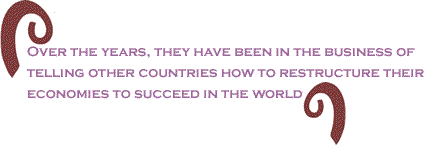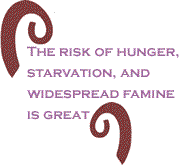
|
|||||||||||||||||||||||

|
|

Custom Search
|
|
 |
|
Why do people around the world say they like Americans, but say they just don’t like the government? It’s
fair to say that As
these corporations go forth into the world, they have the might
of To assist American - and other - corporations in their global trade over the past several decades, there have been institutions set up to assist them in their commerce. The International Monetary Fund, the World Bank, and the World Trade Organization are three of the better known. Over the years, they have been in the business of telling other countries how to restructure their economies to succeed in the world. To
succeed, poor countries were told, they needed to change so they
looked more like a western economy, like the What they did get out of all the advice and loans and grants and “assistance” is the disruption of their way of life, forced migration of rural peoples, and urbanization of their populations, to the point at which there were thousands or millions living literally on the edges of their cities, without a means to subsist, let alone access to work that paid enough to live decently. The poor have suffered long and often, when the effects of the global economy have been visited upon them. One of the results of the economic “restructuring” in so many countries has been the creation of a pool of workers who will accept wages so low that it’s indentured servitude or worse, slavery. That’s where the transnational corporations put their factories and shops. The people who work in them have no place to go, so they work for the lowest of low wages. Countries have been encouraged to eliminate traditional farming in favor of cash crops to pay off the national loans. They have been told to privatize everything, including water, so a profit can be made on the “services” thus privatized. Because the economic meltdown will affect most countries in the world, the risk of hunger, starvation, and widespread famine is great. The people of less developed countries are concerned that they won’t be able to produce enough food and there certainly won’t be enough money to buy it and get it to those who need it. Small
farmers produce about 80 percent of the world’s food, despite what
we’re told by the Mostly,
their agricultural practices are of long standing - hundreds, if
not thousands of years - and they have allowed peoples’ survival
over the millennia. In
A
number of years ago, Monsanto, the giant St. Louis-based chemical
company which has bought out so many regional and family-owned The patenting of seeds goes hand-in-hand with the “restructuring” of economies of developing nations. Profits go to the transnationals and a handful of the local people who run their subsidiaries in those countries. Farmers are required to buy new seeds from the corporation every year. It’s an old story by now, and there are organizations of farmers and their supporters in virtually every country trying to stop the steamroller of corporate control. This week, there is a meeting in Madrid, Spain, on food security and those who have the most prominent place are organizations and corporations like Monsanto, which are the very cause of food insecurity. According to GRAIN, an international non-governmental organization, “The policies of these various institutions and transnational companies have completely failed; it is time to implement the alternative, food sovereignty.” GRAIN promotes the sustainable management and use of agricultural biodiversity, based on people’s control over genetic resources and local knowledge.
There
is a full declaration on the subject, released at the The idea of food sovereignty will become more familiar as the problems of feeding ourselves increase and even farmers in the developed world - the U.S. in particular - may begin to understand their place in the order of things and realize that they have more in common with small farmers in poor countries, than with Monsanto, ConAgra, Archer Daniels Midland and the rest. Food sovereignty, in part, means a system of agriculture based on small, traditional and sustainable methods, with the people in charge of those methods and the markets, in short, an agriculture based on the common good, rather than corporate profits. BlackCommentator.com Columnist, John Funiciello, is a labor organizer
and former union organizer. His union work started when he
became a local president of The Newspaper Guild in the early 1970s.
He was a reporter for 14 years for newspapers in |
|
Any BlackCommentator.com article may be re-printed so long as it is re-printed in its entirety and full credit given to the author and www.BlackCommentator.com. If the re-print is on the Internet we additionally request a link back to the original piece on our Website. Your comments are always welcome. eMail re-print notice
If you send us an eMail message we may publish all or part of it, unless you tell us it is not for publication. You may also request that we withhold your name. Thank you very much for your readership. |
|
| |
|
| January
29, 2009 Issue 309 |
|
| Executive Editor: Bill Fletcher, Jr. |
| Managing Editor: Nancy Littlefield |
| Publisher: Peter Gamble |
| Est. April 5, 2002 |
Printer Friendly Version
in resizeable plain
text format or pdf
format. |
| Frequently Asked Questions |
 |

|
 |
 |
 |
| |
| |






























 In
country after country, the people - their society, culture, and
economy - were not ready to make such a leap, could not make the
necessary changes.
In
country after country, the people - their society, culture, and
economy - were not ready to make such a leap, could not make the
necessary changes.

 The
group stated this week, “This model is based on the right to food
and to the rights of peoples to define their own
The
group stated this week, “This model is based on the right to food
and to the rights of peoples to define their own 






